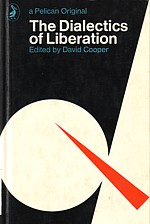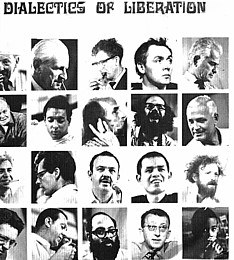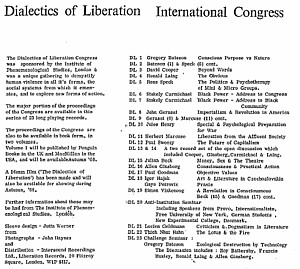|
The Congress on the Dialectics of Liberation was held in London at the
Roundhouse in Chalk Farm from 15 July to 30 July 1967. The present volume
is a compilation of some of the principal addresses delivered on this
occasion. I would like to outline in this brief introduction how the Congress
came about and in particular why we, the organizers, arranged this meeting
between these particular people, why we generated this curious pastiche
of eminent scholars and political activists.
The organizing group consisted of four psychiatrists who were very much
concerned with radical innovation in their own field - to the extent of
their counter-labelling their discipline as anti-psychiatry. The four
were Dr. R. D. Laing and myself, also Dr Joseph Berke and Dr Leon Redler.
Our experience originated in studies into that predominant form of socially
stigmatized madness that is called schizophrenia. Most people who are
called mad and who are socially victimized by virtue of that attribution
(by being 'put away', being subjected to electric shocks, tranquillizing
drugs, and brain-slicing operations, and so on) come from family situations
in which there is a desperate need to find some scapegoat, someone who
will consent at a certain point of intensity in the whole transaction
of the family group to take on the disturbance of each of the others and,
in some sense, suffer for them. In this way the scapegoated person would
become a diseased object in the family system and the family system would
involve medical accomplices in its machinations. The doctors would be
used to attach the label 'schizophrenia' to the diseased object and then
systematically set about the [8] destruction of that object by the physical
and social processes that are termed 'psychiatric treatment'.
All this seemed to us to relate to certain political facts in e world
around us. One of the principal facts of this sort as the war of the United
States against the Vietnamese people. In this latter situation there seemed
to us to be a violent transformation of the idea of 'the enemy'. Firstly,
the enemy became transformed into the 'inhuman': that is to say, men who
embodied all the most detested and therefore externalized attributes of
the 'men' qualities such as underhandedness, cunning, meanness (the conservation
of their supplies and supply-lines), 'violence' (the wish to shit on 'us'),
and 'rape' (the tearing apart of the Western-imposed family pattern -
with its neat analogue, the oriental brothel).
I recently met in Cuba a Vietnamese guerrilla commandant who talked about
how, while he was conducting an operation against the invading U.S. and
mercenary forces, he knew that his wife and three children were being
slaughtered in the next village. He knew that and yet he dispassionately
and successfully carried out his military or counter-military work. This
man acted by choice in a way that conscripted U.S. soldiers never can
do - they simply lose and are lost to their families and can never give
anything up. One human fact that generates most terror in the first world,
the Imperialist World, is the fact of choice, the beginning of freedom,
of spontaneous self-assertion of persons or a whole people. For this reason,
among others, the 'free' opponent must be categorized as 'inhuman'.
After the conversion, on these lines, of man into the 'inhuman', there
is a further subtle metamorphosis. The 'inhuman' become 'non-human'. At
this point they become the ultimate projected versions of ourselves, those
bits of ourselves that we wish most finally to destroy in order to become
Pure Being. If we cannot destroy these bits in [9] ourselves, we have
to destroy them in this outside version. The 'sub-human' or 'non-human'
are totally destructible (witness a similar process with 'Abo'-hunting,
continued well into this century in Australia), and there can be no possibility
of guilt. They have to be wiped out almost before they exist as the non-human
in our metaphysical imaginations. They are of course wiped out by their
being what they are which, of course, is what they are not. They just
need some sort of coup de grace wrapped up in napalm. Then, we
believe, we shall know where we are. Or we shall know where they
are - in our graves!
At the Congress, to bridge the gap between theory and practice, we invited
people such as Gregory Bateson, Herbert Marcuse (link
to text of talk) and Lucien Goldmann to represent the theoretical
pole (in the best Greek sense of this term where theory is theoria
or contemplation), and Stokely Carmichael, who is an activist in the most
real sense of that term.
This book is centrally concerned with the analysis destruction - destruction
in two senses: firstly, the self-destruction 'of the human species by
racism (Carmichael), by greed (Gerassi on Imperialism), by the erosion
of our ecological context (Bateson, Goodman), by blind, frightened repression
of natural instinctuality (Marcuse), by illusion and
mystification (Laing and myself); secondly, closely interwoven with the
first sense, these essays study the human conditions under which men destroy
each other (Jules Henry's essay on Psychological Preparation for War in
particular explored this subject). So it is a book about mass suicide
and mass murder and we have to achieve at least a minimal clarity about
the 'mechanisms' by which these processes operate before we begin to talk
about liberation. However, in each of the essays I have included there
are at least strong hints as to how this liberation might be achieved.
It seems to me that a cardinal failure of all past revolutions has been
the dissociation of liberation on the mass social [10] level, i.e. liberation
of whole classes in economic and political terms, and liberation on the
level of the individual and the concrete groups in which he is directly
engaged. If we are to talk of revolution today our talk will be meaningless
unless we effect some union between the macro-social and micro-social,
and between 'inner reality' and 'outer reality'. We have only to think
back about the personal factor in Lenin that made it possible for him
to ignore so much of the manoeuvrings of the super-bureaucrat Stalin until
it was too late. We have only to consider the limited personal
liberation achieved in the 'Second World' (The Soviet Union and Eastern
Europe). Then we get the point that a radical debourgeoisification of
society has to be achieved in the very style of revolutionary work and
is not automatically entailed by the seizure of power by an exploited
class. We must never forget that conditions of scarcity inhibit - though
not necessarily prohibit - personal liberation in this sense. But in the
First World we have conditions of potential affluence which must be grasped
and realized.
If we are to search for possible paradigmatic instances of this conjunction
in the world, the most immediate situations seem to be those in Cuba,
already liberated, and Vietnam, inexorably on the way to liberation. Both
countries are forced to continue their revolutions in the face
of outside aggression. China on this issue is less certain, but one of
the meanings of the cultural revolution seems to be the diffusion of power
from artificial hierarchies (where the people concerned are figments)
into the minds and hands of actual people. Isolated, they too seem to
be continuing their revolution.
So I think what our Congress was all about was not the dishing up of
solutions to world problems already prepared, but an opportunity to think
the thing out together. This is why the 'principal speakers' mixed so
freely and spontaneously with the 'audience'. It is why so many young
people actually took to living in the Round-house and then took [11] their
seminars out into local pubs, cafes and public places. This was really
the founding event of the Antiuniversity of London which now functions
full-time, carrying over the spirit of the Congress in what may be a permanent
form.
At the Congress we were concerned with new ways in which intellectuals
might act to change the world, ways in which we might move beyond the
'intellectual masturbation' of which Stokely Carmichael accuses us. We
recognized that radical groups in the First World had been conventionally
split - not only ideological but on personal lines. There is always some
sort of spurious messiah who arouses hope and then disappoints hope. This
is not the 'fault' of the 'messiah' - it is the fault of 'hope'. Hope
has to have another appointment. Not now and not then, but some other
time, its own time - which is our time. D. C.
We have to take over time and own it.
Institute of Phenomenological Studies
4 St George's Terrace
London NW3 |


